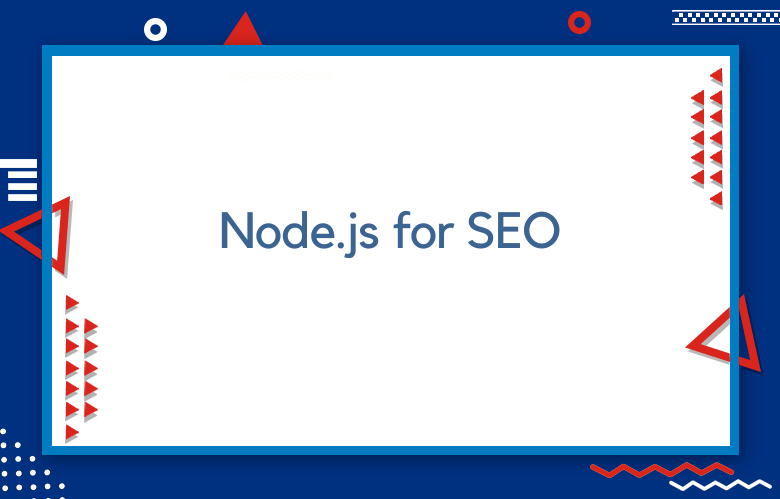How Node.js can Impact Your SEO Strategy: Insights from SEO Consultants

As web developers continue to explore and discover new tools that help make their jobs easier, one of the more popular options is Node.js.
But how does Node.js impact search engine optimization (SEO) and your overall digital marketing strategy?
We will explore the connection between Node.js and SEO from the perspective of experienced SEO consultants. Node.js is a popular JavaScript runtime used to build web applications and websites.
It can be used for both backend and frontend development, allowing developers to create dynamic and interactive websites quickly and easily.
But how does Node.js impact SEO? To answer this question, consider what SEO consultants say about Node.js and its ability to improve your SEO strategy.
Why Your Node.js Website Needs SEO Consulting: The Benefits of Optimization?
Due to its scalability, versatility, and speed, Node.js quickly becomes the number one choice for web developers and businesses.
However, without SEO Consulting, your Node.js website can be challenging to find on search engines like Google and Bing, significantly reducing traffic to the site and limiting its potential success.
SEO Consulting provides many benefits that could help your Node.js website reach higher rankings in search engine results pages (SERPs).
An experienced SEO consultant can help you craft quality content that appeals to users and helps improve rankings.
SERPs by providing specific strategies such as optimizing page titles and meta descriptions or creating relevant backlinks from other websites to yours.
The Role of Node.js in Technical SEO: Best Practices and Recommendations?
When leveraging the power of Node.js, it is essential to keep certain best practices in mind:
Utilize client-side caching mechanisms such as service workers and local storage to ensure quick loading times;
Leverage server-side technologies like serverless functions or leveraging HTTP/2 protocol on node servers;
Minify source code with tools like UglifyJS
Enable Gzip compression
Monitor your site’s performance regularly
Implement advanced tracking solutions such as enhanced E-commerce tracking or Cross-Device Tracking
Take advantage of lazy loading images and other assets included on your pages
Utilize nofollow tags where appropriate
- Optimize the use of meta descriptions and titles for improved SERP ranking.
- Node.js is a server-side platform that enables developers to build fast and scalable applications.
- Node.js applications can be written in JavaScript, a widely used programming language.
- Node.js is an open-source platform, meaning it is free to use, and developers can contribute to its development.
- Node.js is event-driven and can handle multiple concurrent requests without blocking the main thread.
- Node.js has a non-blocking I/O model, which makes it efficient at handling large amounts of data.
- Node.js is single-threaded, meaning all requests are processed in a single thread.
- Node.js is asynchronous, meaning it can process multiple requests simultaneously without waiting for each request to finish before starting the next one.
- Node.js uses an event loop, which enables it to process multiple requests concurrently without blocking the main thread.
- Node.js has a modular design, making extending and adding new features accessible.
Node.js Vs. Traditional Server-Side Rendering for SEO: A Comparison?
- Node.js is a JavaScript runtime that allows developers to build server-side applications with JavaScript.
- Traditional server-side rendering (SSR) generates HTML on the server and sends it to the client.
- Node.js is faster than traditional SSR because it uses an event-driven, non-blocking I/O model that makes it more efficient at handling concurrent requests.
- Node.js is also more memory-efficient than traditional SSR because it uses a shared-nothing architecture where a separate process handles each request.
- Node.js is better suited for SEO than traditional SSR because it generates dynamic content on the server that search engines can index.
- Traditional SSR can also be used for SEO, but it requires more effort to configure and maintain because the HTML must be generated on the server and then sent to the client.
- Node.js is a better choice for SEO if you want your website to be able to generate dynamic content that search engines can index.
- However, if you are not concerned about SEO or already have a website that uses traditional SSR, there is no need to switch to Node.js.
Common Node.js SEO Issues and How to Fix Them: Tips from SEO Consultants?
Crawling
One common issue with Node.js is that search engines may need help crawling and indexing your website’s content.
This can be because Node.js can generate dynamic content that is only sometimes easy for crawlers to access.
To fix this issue, you can use a server-side rendering solution such as Prerender.io to render your pages in HTML so search engines can easily crawl and index them.
Duplicate Content
Another common issue that can occur with Node.js is duplicate content.
This happens when the same content is accessible via multiple URLs, which can confuse search engines and result in lower rankings.
To fix this issue, you can use a canonical tag to specify the preferred URL for each piece of content on your site. You can also use redirects to redirect traffic from duplicate URLs to the desired URL.
Thin Content
Node.js websites can also sometimes suffer from thin content, which is content that offers little value to users.
This can happen if your website consists mainly of dynamically generated pages with very little text or is primarily designed for other purposes, such as selling products or services.
To fix this issue, add more high-quality content to your website or ensure your existing content is well-written and informative.
Slow Page Speed
Another common SEO issue with Node.js websites is slow page speed. This can be because Node.js websites often rely heavily on JavaScript, which can take longer to load than other types of code.
To fix this issue, you can try using a faster server or optimizing your JavaScript code so that it loads more quickly.
Optimizing Node.js Websites for Mobile SEO: A Guide for Consultants?
Optimizing Node.js websites for mobile SEO is integral to a consultant’s job.
While the basics of good SEO are still the same across device types, some unique considerations must be made when optimizing websites and apps built with Node.js for mobile search engines like Google and Bing.
First and foremost, ensuring that your website or app is responsive and renders correctly on mobile devices is essential.
This means testing your site or app across various screen sizes using tools like Google’s Mobile-Friendly Test and utilizing HTML5 and CSS3 media queries to create custom breakpoints based on device type.
Please consider user experience by ensuring any navigational elements are easy to use on smaller devices, such as large clickable buttons and expansive menus that don’t require excessive Scrolling or zooming to use them effectively.
Node.js and Voice Search: What SEO Consultants Need to Know?
Node.js is an open-source, cross-platform JavaScript runtime environment that enables the development of server-side applications.
Recently, it has become increasingly popular due to its scalability and performance benefits.
As voice search continues to grow in popularity, SEO consultants need to be aware of how Node.js can impact their optimization strategies.
Traditional SEO focuses on keyword optimization in web texts, titles, and backlinks from other websites.
However, as more people use voice search, algorithms have been updated to account for natural language processing (NLP).
This means that voice search looks for more conversational and semantically rich phrases instead of keywords.
The impact of JavaScript on SEO: Node.js SEO Consulting Best Practices?
JavaScript can improve SEO Rankings.
One of the primary ways that JavaScript can impact SEO is by improving search engine rankings.
JavaScript can create dynamic and interactive web pages that are more likely to rank highly in search engine results pages (SERPs).
JavaScript can create responsive web design (RWD) websites that provide an optimal viewing experience across all devices.
Googlebot can Render JavaScript.
In the past, some SEOs have hesitated to use JavaScript on their website due to concerns that Googlebot would be unable to render and index the content.
However, this is no longer the case, as Googlebot has been updated to effect and index JavaScript content.
SEOs can now take advantage of JavaScript’s benefits without worrying about negatively impacting their website’s SEO.
AJAX can be used for Infinite Scrolling
AJAX is a programming technique that allows for creating dynamic and interactive web pages.
One of the primary benefits of AJAX is that it can be used to create infinite scroll websites.
Endless scroll websites automatically load new content as the user scrolls down the page.
This can be a great way to keep users engaged and improve your website’s overall UX.
AngularJS can be used for Single-Page Applications
AngularJS is a frontend framework that can be used to develop single-page applications (SPAs).
SPAs are web applications that only require a single HTML page. They are typically faster and more responsive than traditional multi-page web applications.
SPAs can improve your website’s UX by making navigating easier for users.
ReactJS can be used for Creating Rich User Interfaces
ReactJS is a popular JavaScript library that can create rich user interfaces (UIs).
ReactJS UIs are typically more responsive and interactive than those made with other frameworks or libraries.
ReactJS UIs can be easily updated without reloading the entire page, improving your website’s overall performance.
Node.js can be used for Building Scalable Websites
Node.js is a server-side platform that can be used to build scalable websites.
Due to Node’s asynchronous nature, Node.js websites are typically faster and more efficient than those built with other venues.
Node.js websites can handle large amounts of traffic without crashing, making them a good choice for high-traffic websites.
Working with Node.js in an SEO Context: Tips for SEO Consultants?
SEO-Friendly URLs
One of the most important things to remember when working with Node.js is to create SEO-friendly URLs.
This means using keyword-rich URL structures that are easy for users and search engines to understand. Using hyphens (-) to separate words in your URLs is essential, making them more readable.
Use Meta Tags
Another important tip for SEO consultants is to make use of meta tags. Meta tags are HTML tags that provide information about a web page, such as its title, description, and keywords,
including relevant meta tags on your Node. The js-powered website can help improve its ranking on search engine results pages (SERPs).
Optimize Your Content
Of course, optimizing your content is one of the most important ways to improve your website’s SEO.
This means creating high-quality, keyword-rich content that is both informative and engaging. When working with Node.js, you can use various tools and libraries to help with content optimization, such as Cheerio and htmlparser2.
Implement AMP
Accelerated Mobile Pages (AMP) is an open-source project that aims to improve the performance of web pages on mobile devices.
Implementing AMP on your Node.js website can help improve its load times, an important ranking factor for mobile searches. AMP can help improve your website’s click-through rate (CTR) from SERPs.
Use a Content Delivery Network (CDN)
A content delivery network (CDN) is a distributed server system that delivers web content to users based on their geographic location.
A CDN can help improve your website’s performance by reducing latency and ensuring that content is delivered from a server close to the user’s location.
A CDN can also help protect your website from denial-of-service (DoS) attacks.
Enable Gzip Compression
Gzip is a file format and software application allowing for compression and decompression.
Enabling Gzip compression on your Node.js website can help reduce its file size and improve its loading speed.
Gzip compression can reduce bandwidth usage, saving you money on hosting costs.
Minify Resources
Minification is the process of removing unnecessary characters from code without changing its functionality.
When working with Node.js, minifying CSS, JavaScript, and HTML files is essential to reduce their file size and improve loading times.
You can use various tools to minify files, such as UglifyJS and CleanCSS.
Measuring Node.js SEO success: What metrics should be tracked for consulting clients?
Measuring Node.js SEO success is essential for consulting clients looking to use this technology.
Specific metrics should be tracked to assess the success of a client’s SEO efforts.
One important metric is keyword rankings, which can tell you how well a website ranks for particular keywords in search engine results pages (SERPs).
By tracking keyword rankings, you can get a good indication of how well your client’s Node.js website performs in terms of SEO visibility.
By monitoring keywords over time, it’s possible to gain insights into how much progress has been made and where further optimizations may be necessary.
Conclusion
By understanding the relationship between Node.js and SEO, you can ensure that your website’s development process takes into account all aspects of digital marketing—including page loading times, user experience (UX),
scalability, and crawling capabilities for search engine bots—to maximize your organic traffic potential over time.
Working with an experienced team of SEO consultants can help ensure that your website’s development process considers all these factors. This allows you to reach your business goals as quickly as possible without sacrificing quality or performance!
Node.js offers many advantages in improving your website’s SEO performance — from faster page load times due to server-side rendering benefits to URL optimization capabilities explicitly tailored towards specific markets or demographics groups via dynamic URLs generated on the fly by Node.js scripts.
When appropriate, these features can help boost Google rankings significantly over time, driving organic traffic back to your website and increasing customer engagement.



